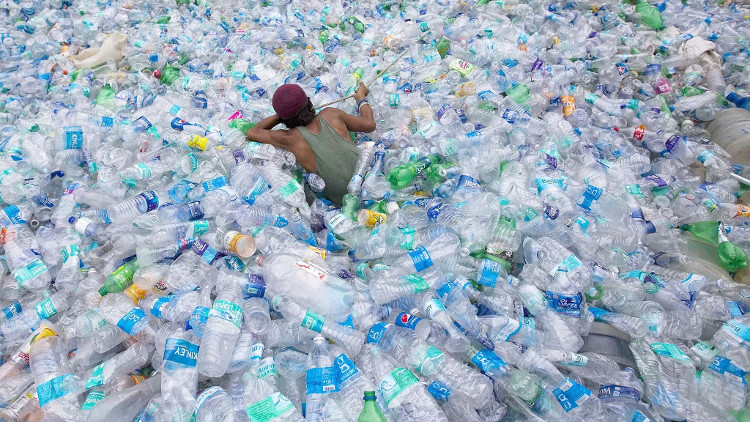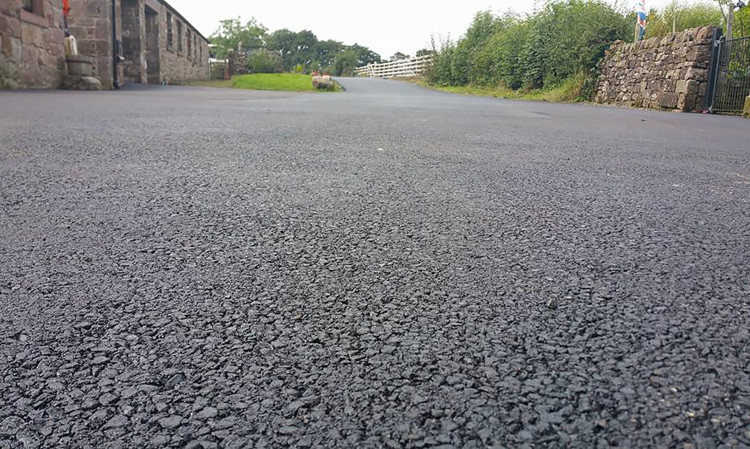Sugar made from waste plastic, life expectancy is 10 times higher
In order to address the pollution of plastic waste in the world and save crude oil for road construction, McCartney engineers recycle plastic into a material called MR6.
This material has been successfully tested. Currently, it is estimated that people spend hundreds of millions of barrels of oil to build nearly 40 million km of asphalt built to connect regions of the Earth's surface.
Recognizing the increasing pollution of plastic waste and the waste of natural resources, Toby McCartney engineers have come up with an extremely interesting initiative. Specifically, his company - MacRebur, based in Scotland, has created a kind of carpet material of up to 60% better quality and 10 times longer lifespan than conventional plastic routes.
And most surprisingly, they are made from recycled plastic waste .

There are more than 5 trillion plastic waste pieces on the ocean.
It is a fact that in any city, roads are constantly repaired and upgraded because of the effects of weather, vehicles and threatening 'potholes' . On the other hand, there are more than 5,000 billion pieces of plastic floating in the ocean. How to solve these two problems at the same time? McCartney's answer is to make sugar from plastic waste to save oil, improve sugar quality, and use waste to make it useful.
Specifically, he created a plastic recycling material called MR6 to replace common asphalt (extracted from crude oil and widely traded through famous oil companies such as Shell).

MR6 is produced directly from waste plastic and can completely replace common asphalt.
This initiative stems from the story of McCartney's daughter. At school, when the teacher asked, "Do you know anything in the ocean?" , she raised her hand to answer: "Plastic!". This answer caused McCartney to constantly think about the recycling of plastic waste so that his daughter's world would be cleaner and cleaner.
Previously, he had worked in India and was impressed to see the Indians burning plastic to fill the 'potholes' and 'elephants' on the road. Since then, the idea and his colleagues Nick Burnett and Gordon Reid embark on the design of this new sugar material .
Common roads are made up of about 90% of rock, sand and limestone with 10% bitumen. MacRebur products will use waste plastics, agricultural waste and commercial waste to create MR6 to replace most bitumen for road carpet.
At asphalt plants, the MR6 plastic pellets are mixed with the exploited stone and a bit of bitumen as the usual sugar filling material.

A path is created from MR6.
According to MacRebur, roads built with MR6 are less likely to crack than regular asphalt. In addition, it helps maintain tire durability, which can save fuel for any type of vehicle on this road.
Currently, this idea has been tested on the road near McCartney farm. This method of carpet materials then continued to be used in Cumbria, England.
- How long does it take for plastic waste to decompose?
- The end of the era of plastic garbage is probably coming soon, thanks to this invention
- For the first time Vietnam built roads from plastic waste
- MR6: Road carpet concrete from waste plastic waste
- Tragedy: Whales are eating hundreds and thousands of plastic trash every day
- Producing bricks from ... plastic waste
- WWF: The Mediterranean is about to become
- Vietnam is the top 5 countries that discharge most plastic waste into the sea
- Plastic waste - The potential danger to the ocean
- 269,000 tons of contaminated plastic floated on the ocean
- Turning plastic into petroleum: 2-in-1 solution for plastic waste
- Find creatures that help destroy plastic waste fastest
 Is the magnetic North Pole shift dangerous to humanity?
Is the magnetic North Pole shift dangerous to humanity? Washington legalizes the recycling of human bodies into fertilizer
Washington legalizes the recycling of human bodies into fertilizer Lightning stone - the mysterious guest
Lightning stone - the mysterious guest Stunned by the mysterious sunset, strange appearance
Stunned by the mysterious sunset, strange appearance